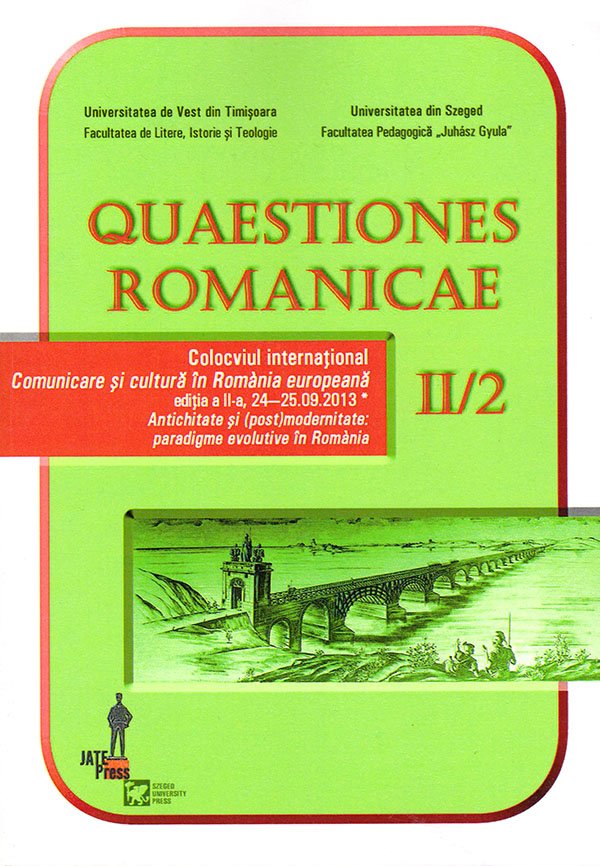Consideraţii tipologice asupra operei lui Tudor Arghezi
Abstract: (Typological considerations on Tudor Arghezi’s work) The attempt to sketch some general coordinates to define a certain typological profile of Arghezi’s work can be carried out within the theoretical framework provided by anthropological poetics, orientation developed by Mircea Borcilă in numerous studies. This perspective of poetics achieves a comprehensive and coherent synthesis of Coseriu’s integral linguistics and the theory of Lucian Blaga’s metaphorical duality, substantiating the understanding of the literary text in its specificity, as a text whose meaning is oriented towards poetic finality, generating worlds. On a more specific typological level, Mircea Borcilă places the general types of internal finalities of the creative process generating poetic meaning: plasticizing finality and revealing finality. We believe that, in general, in Arghezi’s work one can identify a constant orientation of the meaning towards the analogical restoring of concrete experience in the text or even towards materializing the impalpable. This orientation of the meaning thus subsumes and motivates constitutive textual processes (e.g. dynamics of materialization of the abstract) and at the same time reveals the plasticizing finality of the semantic process generating meaning, thus defining the typological profile of Arghezi’s lyrical universe. Also Arghezi’s testimonies about understanding poetry (revealing his explicit poetics) support the same plasticizing finality in creating poetic meaning, outlining the horizontal poetic view which finds and recognizes "the shred of aura" carried by man "on the outside or on the inside". This plasticizing finality motivates the textual strategies establishing meaning in Arghezi’s poetic world, at the same time defining its typological profile.
Keywords: poetic typology, poetic finality, plasticizing finality, poetic meaning.
Rezumat: Demersul schiţării unor coordonate generale care să contureze un anumit profil tipologic al operei argheziene se poate realiza în cadrul teoretic oferit de poetica antropologică, orientare dezvoltată în numeroase studii de către Mircea Borcilă. Această perspectivă a poeticii realizează o sinteză teoretică amplă şi coerentă a viziunii lingvisticii integrale coşeriene şi a teoriei dualităţii metaforice a lui Lucian Blaga, fundamentând înţelegerea textului literar în specificitatea lui, ca text al cărui sens este orientat înspre finalitatea poetică, creatoare de lumi. La un nivel tipologic mai specific, Mircea Borcilă situează tipurile generale de finalităţi interne ale procesului creator de sens poetic: finalitatea plasticizantă şi finalitatea revelatoare. Considerăm că, în general, în opera argheziană putem identifica o constantă orientare a sensului înspre refacerea analogică în text a concretului experienţei sau chiar spre materializarea impalpabilului. Această orientare a sensului îşi subsumează şi motivează astfel procedeele textuale constitutive (ca de exemplu, dinamica concretizării abstractului) şi, în acelaşi timp, relevă finalitatea plasticizantă a procesului semantic creator de sens, conturând astfel profilul tipologic al universului liric arghezian. De asemenea, mărturiile argheziene despre înţelegerea poeziei (care relevă poetica sa explicită) susţin aceeaşi finalitate plasticizantă în crearea sensului poetic, conturând privirea poetică orizontală care constată şi recunoaşte „ţandăra de aureolă” purtată de om „pe dinafară sau pe dinăuntru”. Această finalitate plasticizantă motivează strategiile textuale prin care se instituie sensul şi lumea poetică argheziană, definindu-i în acelaşi timp profilul tipologic.
Cuvinte cheie: tipologie poetică, finalitate poetică, finalitate plasticizantă, sens poetic.
